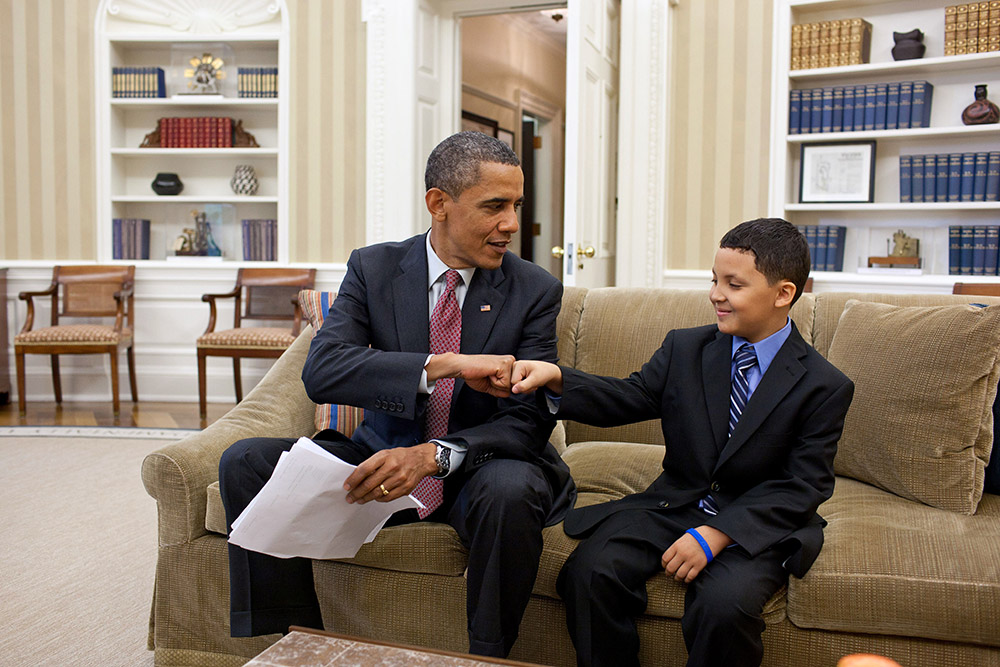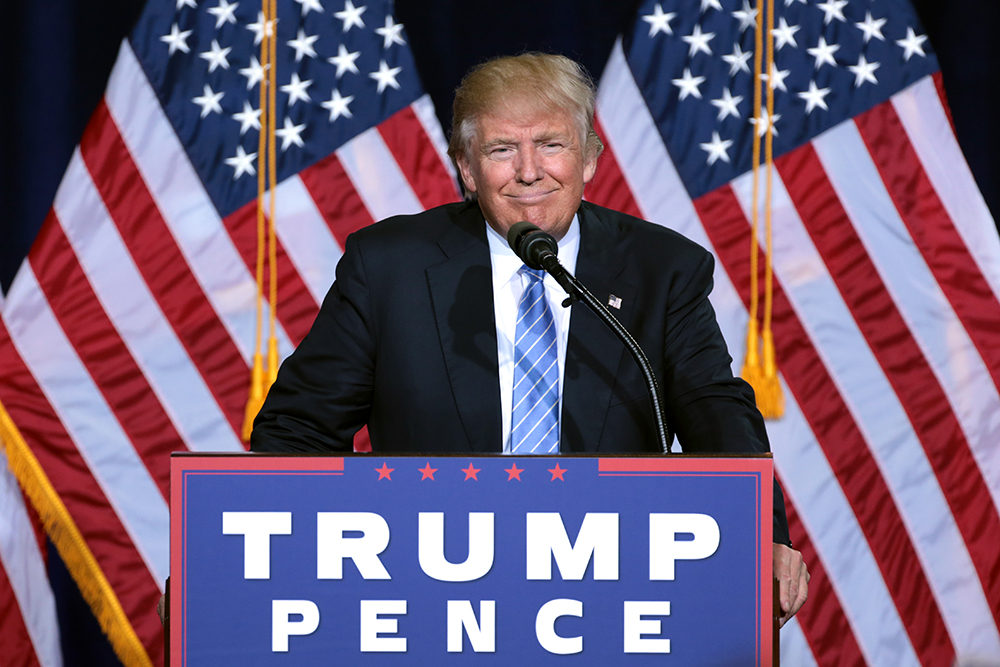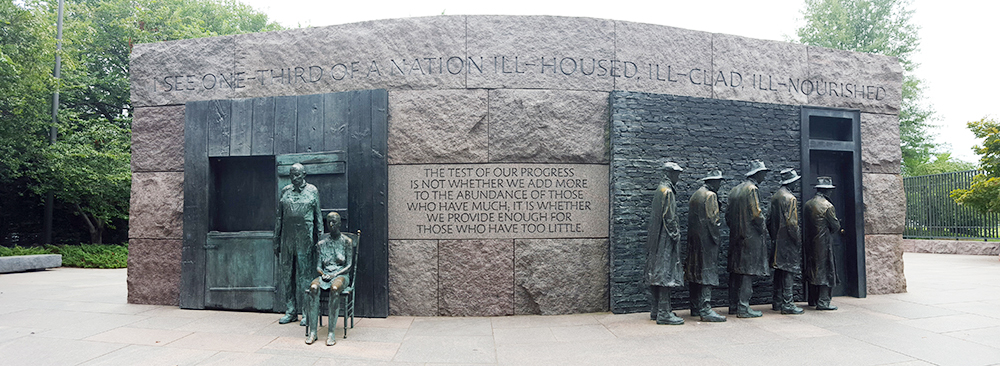 Depending on who you talk to, last Wednesday morning we either woke up to a different world or we woke up to a depressingly predictable one. While none of the pollsters or aggregators really saw the results of this election coming, for too many people mocked or derided by the Donald Trump campaign in the past year and a half, this is the America they know. Nevertheless, a Trump administration promises drastic and all too real changes to our country. Churches and ministers should prepare for these changes, because they will have profound material and spiritual consequences for ministry.
Depending on who you talk to, last Wednesday morning we either woke up to a different world or we woke up to a depressingly predictable one. While none of the pollsters or aggregators really saw the results of this election coming, for too many people mocked or derided by the Donald Trump campaign in the past year and a half, this is the America they know. Nevertheless, a Trump administration promises drastic and all too real changes to our country. Churches and ministers should prepare for these changes, because they will have profound material and spiritual consequences for ministry.
Youth and children’s ministry in the Age of Trump
The president of the United States has often been presented as a role model for the nation’s children. Barack Obama in particular has lived into this role. He showed young children of color, especially black children, that they too could be president. He demonstrated clearly what a steady hand and measured temperament look like in leadership. Despite the racism and prejudice thrown at him and his family on a daily basis, President Obama rarely lost his composure — even when he had every right to do so. Regardless of how you feel about his policies, in his posture President Obama consistently sought inspiration over division even when such optimism seemed unfounded. In the highs and lows of his presidency and campaigns, many people (especial younger Americans and people of color) found renewed hope in our country. To be clear, President Obama has faults like any president or human being, but he was consistently a public figure who our children, and the rest of us, could look up to in many ways.

Barack Obama with Diego Diaz, who wrote the president a letter. (Photo/Flickr)
Donald Trump could not be more different than Barack Obama in almost every way. Regardless of your political preferences, Trump is not just rough around the edges. While ultimately the glaringly obvious flaws in his character and detestable behavior did not dissuade voters, we cannot hold him up as a role model. By electing Trump, we elected a man who has called Mexicans rapists and criminals, subsequently suggested that Mexican heritage disqualifies anyone from judging him fairly, disparaged a Muslim Gold Star family and proposed banning every one of their faith from entering the United States, called women “dogs” and “pigs” and bragged about sexually assaulting women. Those are just some of the things Donald Trump has said, to say nothing of what he has done and been accused of doing — from racist housing discrimination to rape and sexual assault. Regardless of your political positions, we do not need to raise a cohort of little Donalds.

Donald Trump addressing a crowd of supporters. (Photo/Gage Skidmore)
Instead, we need to be more intentional than ever when it comes to teaching our children and youth about prejudice and abuse. Trump’s election requires of us a renewed and reinvigorated effort to teach our youth and children (and our adults for that matter) about consent and sexual assault, racial inequality and white supremacy, sexuality and homophobia, immigration and xenophobia and the whole range of human dignities and vile prejudices. We have not done a good job of this teaching or Trump would not have been so successful in the first place. But there is now a special urgency to address these concerns from as early an age as possible when the leader of the United States can get away with such speech and behavior with impunity. We failed to repudiate these behaviors and beliefs with our votes; now we must work daily to condemn them with our lives.
Missions and community outreach in the Age of Trump
Our election of Trump does not just enable his domestic agenda, but that of his allies who would unravel major aspects of America’s social safety net. That should give missions ministers chills. Whether it is privatizing Social Security, gutting Medicare and Medicaid, repealing the Affordable Care Act, cutting the Supplemental Nutrition Assistance Program (SNAP) and other welfare resources, scaling back public education or shifting tax burdens on the lower classes, the agenda of those who now hold sway in all three branches of the federal government could dramatically change the lives and fortunes of many Americans. Regardless of your political beliefs and positions, these changes will impact many of your neighbors, your fellow church-goers and your family and friends. These Americans will need help and our government will no longer be willing or able to provide it. Party affiliation aside, it is fundamentally unjust and un-Christian to stand by and let legions of people suffer this way. Again, this is not just a question of your political position, it is about the well-being of your neighbors.

Memorial commemorating the New Deal and the Great Depression on the National Mall in Washington. (Photo/Wesley Spears-Newsome)
Our missions and community outreach ministries under the Trump administration will have to do more than disaster relief and literacy programs. These are important efforts that should not be maligned, but our missions ministries should have always done more — now, they must. Churches should consider what it would look like to feed their communities with dignity and respect through programs like community meals and accessible and non-judgmental communal food pantries. If kids lose free and reduced breakfasts, lunches and other meals due to cuts in welfare and education funding, churches should be there when the government will not be. Churches filled with health-care professionals should look at how to offer free or reduced-cost care for the millions of Americans who could lose health insurance over the next four years — or those who will be pushed even further away from obtaining such care. Churches filled with legal professionals should look to provide defense for those facing the harsh deportation force Trump has promised to bring — or from the current strict measures already in place.
Churches should be safe sanctuaries for those the Trump administration could target, such as our Muslim brothers and sisters or immigrants and their families. Congregations should partner with the non-governmental and nonprofit organizations that seek to repair and advocate for our safety net in what promises to be a tumultuous presidency.
None of these are perfect solutions and they do little to address the systemic facets and nature of prejudice and injustice. Churches, nonprofits and other non-governmental agencies should not have to bear the brunt of the “general welfare” the Constitution promises to promote. The lives of our neighbors should not be contingent upon our changeable sense of generosity or our own fickle fortunes. But depending on the efficiency and speed of our new government, stopping the bleeding may be first priority.
Spiritual formation in the Age of Trump
Here may be where our churches need to do the most work, because we failed to recognize a heretical distortion of the gospel in our midst — and, instead, we embraced it. The Gospel According to Donald Trump relies on two primary things: selfish, violent power and fear of the stranger. When it comes to those who disagree with him or reject his advances, we have every shred of evidence we need to know that Trump relies on selfish, violent power in response. Whether it is barring reporters from his campaign, pursuing harsher libel laws to punish his critics, encouraging violence at his rallies, demeaning and belittling those who reject him, or berating and assaulting those over whom he has power, Trump has consistently chosen selfish, violent power in word and deed to get what he desires.
His rhetoric, too, has been characterized by exploiting and advocating for a fear of the stranger. Whether the stranger is Muslim, Mexican, immigrant, or fellow citizen, Trump consistently and ruthlessly characterized whole groups of people (especially non-white or non-male groups) as strangers to be feared and even hated. Such a message could hardly be further from the truth of the gospel.
As I said before Trump was elected, the Christian story is fundamentally rooted in the kindness of a stranger and the welcoming of us as strangers. Remember the parable of the Good Samaritan: we are not just called to the stranger we may despise, but our Stranger God is kind to us. Remember the parable of the Final Judgment: the judge is a stranger not just to the goats who ignore him but also to the sheep who help him. And, lest we forget, are we not Gentiles to whom the God of Israel, incarnate in Jesus Christ, was a stranger to us? When preaching to the Gentiles in Athens, Paul pointed to an altar dedicated “to an unknown god,” the stranger. Good news came to our Gentile forebears in the person of a stranger to us, a God we did not know. This stranger extended grace to us, yet so many of us endorsed and embraced a story that demonized the stranger and therefore rejected any accompanying grace. We must reject that false gospel in favor of the one Paul passes on to us: “Remember that you were at that time without Christ, being aliens from the commonwealth of Israel, and strangers to the covenants of promise, having no hope and without God in the world. But now in Christ Jesus you who once were far off have been brought near by the blood of Christ. For he is our peace; in his flesh he has made both groups into one and has broken down the dividing wall, that is, the hostility between us” (Ephesians 2:12-14, NRSV).

Depiction of the Good Samaritan Parable by Gunnar Bach Pederson.
Further, God does not call us to this brutal and selfish violence that seems to characterize our new president. We follow a Jesus who said we should turn the other cheek, give to those who ask of us, and love our enemies. This same Jesus rejected temptations to power, control and coercion offered to him by Satan. Paul described this same God in this way: “Though he was in the form of God, did not regard equality with God as something to be exploited, but emptied himself, taking the form of a slave, being born in human likeness. And being found in human form, he humbled himself and became obedient to the point of death — even death on a cross” (Philippians 2:6-8). Paul told us to be of the same mind of this God, not of the same mind with a vengeful demagogue who threatens violence and abuse. God does not condone such behavior, and we should not either. But we did with our votes.
That is not to say that Hillary Clinton and the Democrats represent the true gospel — far from it. Nevertheless, when confronted with a message clearly antithetical to the gospel Christians believe, many of the people who fill our pews and pulpits embraced it not with reluctance but enthusiasm. That’s a huge problem. I do not say this will take the most work from us at the expense of the material mission of the church in the world. This will take more work than feeding all the hungry and thirsty, clothing all the naked, and healing all the sick because it requires repentance and conversion on our part. Too many of us made not what was a pragmatic choice last week, but a deeply enthusiastic and spiritual one. We embraced another gospel.
Church in the Age of Trump
Churches at their best are communities of subversion, pockets where the rules of a cruel and hostile world do not apply. Unfortunately, with the results of last week’s election, the ability of our churches to be those kind of places was gravely imperiled. Fifty-eight percent of Protestants supported Trump and so did 81 percent of evangelical Christians. White men and women, too, were the only race/gender groups who supported Trump in the majority. Most of the ministers and lay people who read Baptist News Global belong to these churches — white Christian churches. Whether or not we condoned Trump with our individual votes, it was our friends and family who did.
At Bible study, in worship, and even at Thanksgiving dinner, we need to talk about that choice. Our churches do not need simply to be places for healing after a divisive election season, they need to be places that proclaim and live out a gospel that looks radically different than the gospel according to Trump. We must teach our children, say to our neighbors, friends, and family, and protest to Trump himself that this cannot be our gospel.
